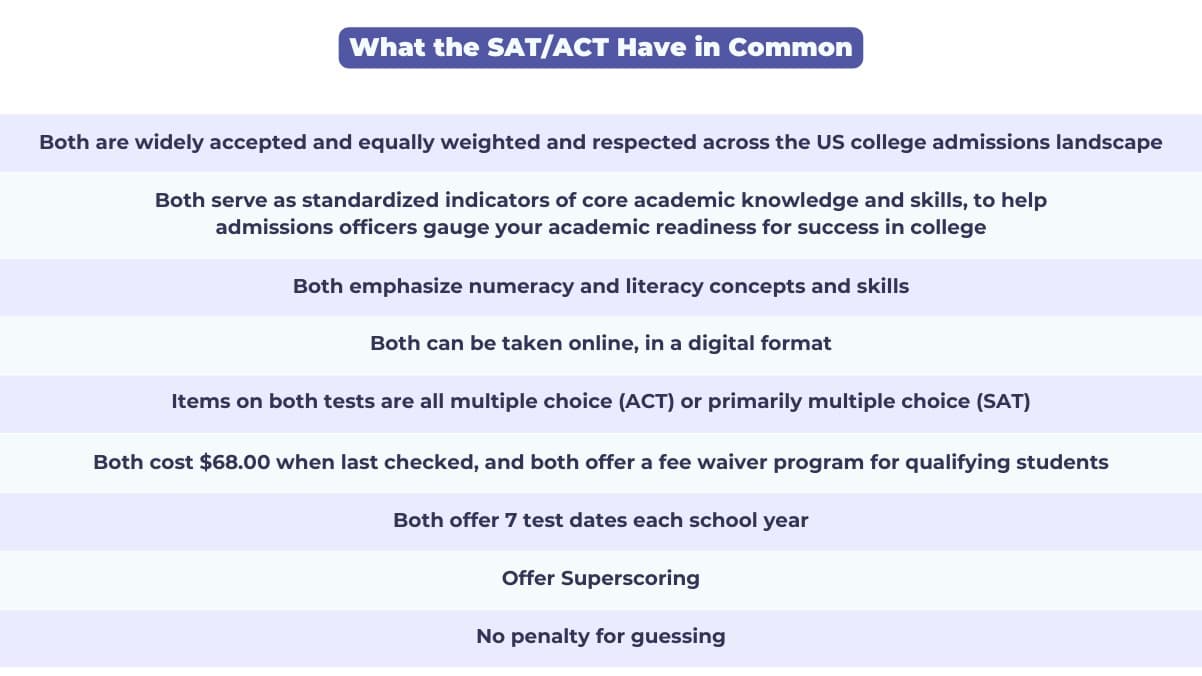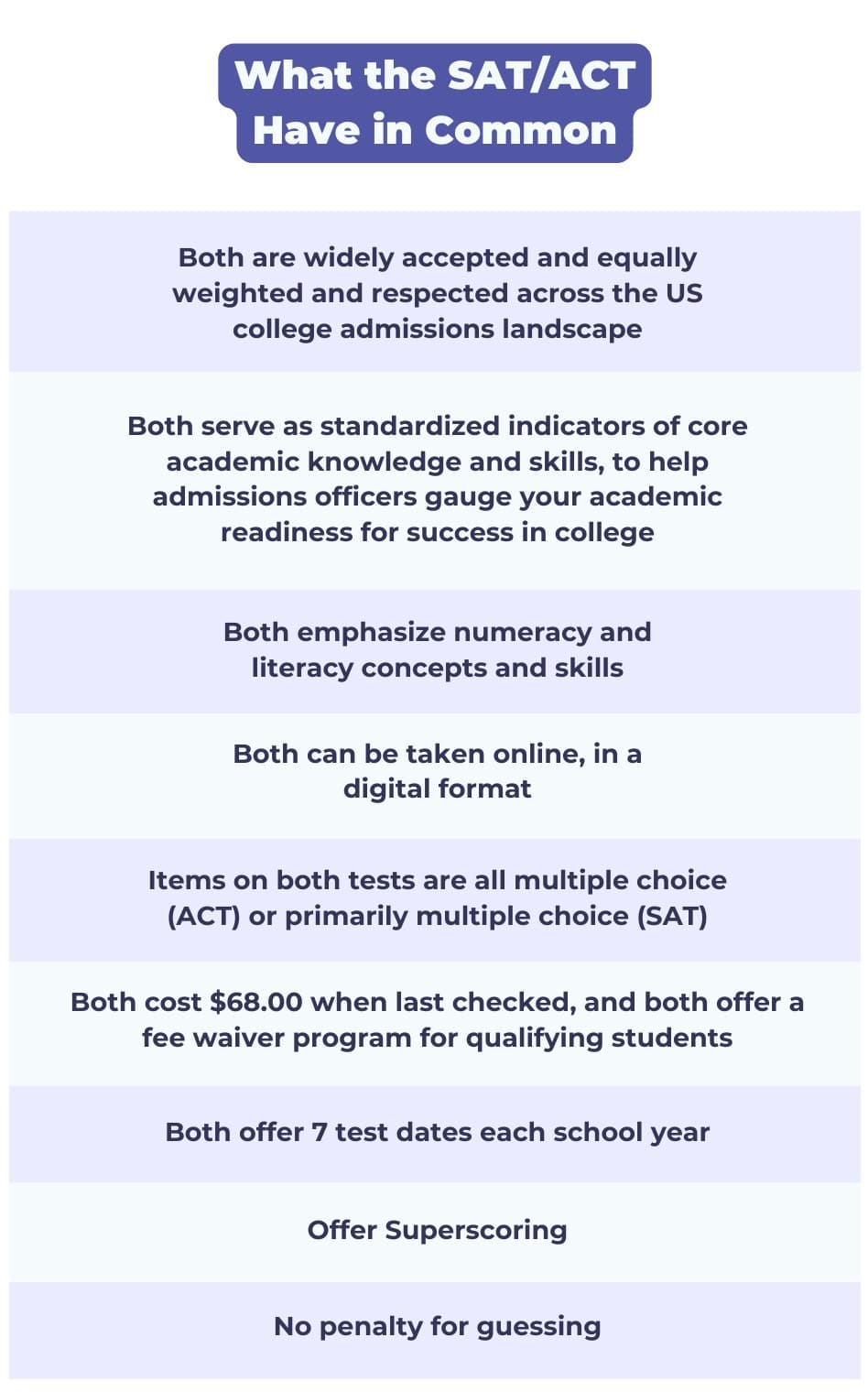SAT vs. ACT: What's the Difference and Which Test Should You Take?


Keith N.
Graduate of UC Berkeley & UC Santa Cruz
Summary
The SAT and ACT are both widely accepted college admissions exams with a shared emphasis on literacy, mathematics, and critical thinking, but they differ in structure and pace. The ACT includes a dedicated Science section and provides no formulas during its Math section, while the SAT skips a science test, and math formulas are provided. Additionally, the SAT uses an adaptive digital format (adjusting difficulty based on immediate performance), and allows more time per question, while the ACT remains linear and tends to feel faster paced. Taking sample practice tests can help students determine which test aligns better with their test-taking strengths, but careful preparation is typically the most important factor in improving scores.
Both the SAT and ACT are widely accepted and respected in the world of US college admissions. So students really can choose to take either one, but students are left wondering if one test is easier or harder.
Determining if you'll have an edge on the SAT or ACT depends on a handful of differences — many fairly subtle ones — and on your own individual strengths and test taking preferences.
The SAT vs. ACT: Key Differences for Test Difficulty
Any single difference between the SAT and ACT, considered alone, may not go far in helping you decide which test best suits you. Why? Because many of the differences are subtle and some can cancel out others when you consider them all together and in the light of your own academic and test taking strengths and preferences.
But, by looking at several factors together, such as differences in subject matter emphasis, language difficulty, structure, and pacing... you may start seeing that one test makes a better option for you personally.
The chart below highlights differences that tend to impact test-taking difficulty for many students.
The SAT vs. ACT: Test Taking Difficulty
| SAT | ACT | |
|---|---|---|
| Pacing & Duration | Takes less time for the whole test; gives you more time per question | Takes more time for the whole test; gives you less time per question |
| Question Formats | All items are multiple choice except for some of the math items, where you're required to fill in the answer | Multiple choice format only (except for the optional essay writing test) |
| Critical Thinking | Most experts agree that SAT questions on average require more depth in analysis and critical reasoning | Questions are typically viewed as being simpler and more direct |
| Science and Scientific Analysis | No separate section for science | The ACT has a stand-alone science subtest covering: - Introductory concepts in life sciences, earth sciences, and physical sciences - Scientific method, analyzing claims and data, and scientific reasoning |
| Reading Comprehension | The SAT reading questions may, on average, require deeper analysis, but the reading passages on average are shorter and the format is simpler, with typically only one question per passage More emphasis on reading that includes charts, tables, and data analysis | Reading passages are longer on average, but often focus on more straightforward aspects of reading comprehension compared to the SAT reading section |
| English | The writing section (all multiple choice) tests punctuation, grammar, and composition skills Vocabulary is tested “in context” in various components of the Reading and Writing tests Presents more challenging vocabulary (in both the reading and writing components), such as more technical, rare, or archaic words Assigns only one question per reading passage and reading passages tend to be shorter compared to ACT | The ACT has a stand-alone English test with longer passages that can have numerous corresponding questions Tests vocabulary, word usage, grammar, and rhetorical structures and conventions Some questions (on elements of rhetorical style and word usage) may involve levels of nuance that make them challenging |
| Math | More emphasis on mathematical reasoning and problem solving Longer and more complex word problems or problem-solving scenarios and questions Eligible calculators allowed Formulas provided for reference | More direct math questions, but more content emphasizing geometry and statistics (compared to the SAT) Eligible calculators allowed Formulas not provided for reference |
As you can see, some differences really stand out, like the ACT test having a required science section, but not the SAT. Or, the ACT not including formulas for the math section, while the SAT does provide them.
Likewise, the ACT may have more direct reading comprehension questions, but often with several questions attached to a single and longer reading passage, compared to the SAT.
SAT vs. ACT: Features They Have in Common


No. Both the SAT and ACT are widely accepted and respected across the US college admissions landscape.
Originally, the SAT was considered more of a general academic aptitude test, while the ACT was intended more as a placement test gauging mastery of high school concepts. Today, these distinctions have largely blurred.
As you can see, both tests do have a lot in common.
- Both focus on literacy, numeracy, and evidence-based critical thinking skills primarily
- Both can be taken digitally
- Both allow superscoring
But, now it's time to look at overall structure, where there are some differences that stand out. However, these may not be differences that truly help you decide which test is your best fit.
SAT vs. ACT: Test Structure
Overview of Test Structure
| SAT | ACT | |
|---|---|---|
| Testing Options | The SAT is ONLY in digital format (online) | The ACT still offers a paper/pencil option AND a digital option (online) |
| Adaptive vs. Linear Formats | The SAT uses an adaptive test format — the level of difficulty adjusts up/down, based on how you answer prior questions | The ACT is linear (non-adaptive), both the paper and online version |
| Number of Sections | The SAT has 2 sections: 1. Reading & Writing 2. Math | The ACT has 4 sections: 1. English 2. Math 3. Reading 4. Science Plus an OPTIONAL Essay Exam |
| Time and Time per Question | Takes 2 hours and 14 minutes READING: 71 seconds per question (64 minutes/54 questions) MATH: 95 seconds per question (70 minutes/44 questions) | Takes 2 hours and 55 minutes READING: 67 seconds per question (40 minutes/36 questions) MATH: 67 seconds per question (40 minutes/36 items |
| Question Format | Mostly multiple choice — a few math questions require you to fill in an answer | All multiple choice |
The main differences here are that the ACT still offers a paper/pencil option, but not the SAT. For this reason perhaps, the digital ACT is linear, while the SAT is adaptive. A nice feature of adaptive formats is that they can better align test items to the test takers ability level, to more quickly determine an accurate score and rank.
The fact that it's linear may be one reason why the ACT test session takes about 40 minutes longer all together (not including the optional ACT writing test).
As for pacing, the SAT tends to give you an edge, giving you some extra seconds per question.
Traditional tests like the ACT use a linear format, meaning every student answers the same set of questions in a fixed order. The SAT, however, is adaptive in its digital format. As you answer questions, the test adjusts—giving you harder or easier questions based on your responses. This helps pinpoint your skill level more efficiently, which is likely one reason why the SAT is shorter than the ACT!
SAT vs. ACT: Key Content
Here’s a different angle: a comparison focused on subject-matter content as such.


Key Content Highlights — SAT vs. ACT
- Reading & Language: In terms of reading comprehension, grammar, and composition skills, both tests have similar content, but organize it differently.
- Science: The ACT has a section focused on science; the SAT does not. Keep in mind the ACT science covers a broad range of science disciplines but mostly just rudimentary concepts, with the primary emphasis on evidence-based data analysis and scientific reasoning.
- Writing: There is no writing required for the SAT. The ACT offers you an optional Essay Writing Test. Keep in mind that virtually no prominent universities require applicants take the ACT essay test. So is it useful? ACT.org suggests that it offers you an alternative for demonstrating language proficiency if you didn't already get high marks in your language arts courses.
SAT vs ACT: How Different are the Questions with Jamie Beaton
Comparing SAT and ACT Scores & Score Ranges
SAT/ACT Score Conversion Chart
| SAT Composite Score | ACT Composite Score |
|---|---|
| 1600 | 36 |
| 1560-1590 | 35 |
| 1520-1550 | 34 |
| 1490-1510 | 33 |
| 1450-1480 | 32 |
| 1420-1440 | 31 |
| 1390-1410 | 30 |
| 1350-1380 | 29 |
| 1310-1340 | 28 |
| 1280-1300 | 27 |
| 1240-1270 | 26 |
| 1200-1230 | 25 |
| 1160-1190 | 24 |
| 1130-1150 | 23 |
| 1100-1120 | 22 |
| 1060-1090 | 21 |
| 1020-1050 | 20 |
| 980-1010 | 19 |
| 940-970 | 18 |
| 900-930 | 17 |
| 860-890 | 16 |
| 810-850 | 15 |
| 760-800 | 14 |
| 720-750 | 13 |
| 630-710 | 12 |
| 560-620 | 11 |
While US colleges and universities tend to take a holistic approach to admissions — as opposed to setting any strict requirements for test scores or GPA — a good SAT score is between 1510 and 1560, and a good ACT score between 33 and 36 based on the score average score ranges of applicants to highly selective schools.
The SAT and ACT have vastly different scoring scales. The SAT uses a cumulative 1600 point scale, the ACT a cumulative 36-point scale. In the end, schools know how the different scales compare to one another, making this factor a moot point overall. However, some experts contend that the ACT, because of its format and 36-point scale, gives you better odds if you're chasing a perfect score!
Statistically, it is easier to get a perfect score on the ACT, but every student is different. The content for each test is different. However, in general, ACT questions tend to be more straightforward, whereas SAT questions tend to be trickier.
- Vincent Lim, US Admissions Strategist, Crimson EducationSAT vs. ACT: Demonstrating English Proficiency
Many international students need to demonstrate English language proficiency among other admissions requirements. Did you know that many schools allow you to use your score on the ACT English test or the SAT Reading/Writing test to serve as proof of English proficiency?
Policies can differ widely from school to school, however, so be sure to check with each school you’re applying to.
Examples of SAT & ACT Score Benchmarks for English Proficiency
| School | Score Benchmarks for English Proficiency Requirements |
|---|---|
| The University of California (all campuses) | Score 24 or higher on the ACT English test |
| Columbia | Score 700 or higher on the SAT Reading/Writing test, or 29 or higher on either the Reading or the English section of the ACT |
| USC | Score 650 or higher on the SAT Reading/Writing test, or 27 or higher on the ACT English test |
| University of Michigan | Score 510 or higher on the SAT Reading/Writing test, or 18 or higher on the ACT English test |
| University of Washington | Score 580 or higher on the SAT Reading/Writing test, or 22 or higher on the ACT English test |
SAT vs. ACT: Key Takeaways for Decision Making
1. Takeaways for Reading & Language Challenges
- Most experts don’t see a big difference between the language sections of the SAT vs. ACT.
- Some experts think that the SAT language sections may be a bit easier for those who are less proficient in English language and/or reading comprehension.
- Others think the ACT Reading and Language questions are easier on average, but note that there are more questions total and less time allotted per question.
2. Takeaways for Math Challenges
- A handful of challenging SAT math questions require you to fill in an answer, not choose one from a list, eliminating the option of “guessing” or “picking” an answer.
- The SAT and ACT test many of the same core math concepts, but the SAT has a stronger focus on algebra, while the ACT covers a broader range (including more geometry, statistics, and trigonometry) at a more basic level of understanding.
- The SAT often demands deeper conceptual knowledge and more complex math reasoning with longer text-based questions.
- The SAT allows more time per question (slower pace); the ACT gives you less time per question (faster pace).
- The SAT provides formulas on the test; the ACT does not.
- Both the SAT and ACT allow the use of a qualifying calculator.
3. Takeaways for Science Challenges
The ACT has a section devoted to science, the SAT does not. So if science and scientific reasoning are not your strengths, this may be a point in favor of taking the SAT.
But, keep in mind that the SAT does include a smaller number of questions with some science content — across the language and math sections — for testing evidence-based reading skills, data analysis skills, and math skills, including in charts, tables, and graphs.
SAT vs. ACT: Deciding With the Help of Practice Tests
I’ve done my best to highlight key differences to help you pick the best test for your preferences. Unfortunately, most students won’t find a clear cut answer in all of this, and sometimes even experts disagree on what advice to give!
Fortunately, another way to test the waters, so to speak, is with the help of practice tests.
Sample questions and even comprehensive practice tests are widely available for both the SAT and ACT, making this both an easy and a surefire way to see for yourself if you truly prefer one test over the other.
Finding Online Practice Tests
For a really quick way to sample both tests, Crimson Education offers online Mini SAT/ACT Practice Tests.
It’s a free resource, even if you’re not part of the Crimson network (yet)!
Use this link to go there now…
Final Thoughts
If you find it hard to see a big difference between these two tests, you're not alone! But, if you want to be more confident you're choosing the test that's the best fit for you, use sample SAT test questions and sample ACT test questions to get more familiar with the tests' subtle differences.
If you want a shortcut to sampling both tests, check out Crimson's online SAT and ACT Practice Tests.
Also important, once you pick the test you prefer, you'll want to leave time for preparation and practice before your scheduled test day. For most students, thorough preparation is probably more important than which test you take if you really want to reach for a higher score!
Check out these resources for helpful information and tips on how to prepare:
How To Study for the SAT: Tips and Strategies for Success
How To Study for the ACT: Tips and Strategies for Success
Finally, if you're not already part of the Crimson network, you're missing out on more personalized strategies and support for your college journey. Crimson Education offers a range of services in college admissions consulting that can support you throughout your academic journey.
Our schedule of upcoming events highlights our dedication to student success with opportunities for further learning and engagement.
If you’re facing challenges or simply want to optimize your college experience, maximize your chances of admission with our college consultants and get started with a free consultation. For inspiration, learn more about us, and check our results to discover how Crimson Education has helped students like you thrive!


